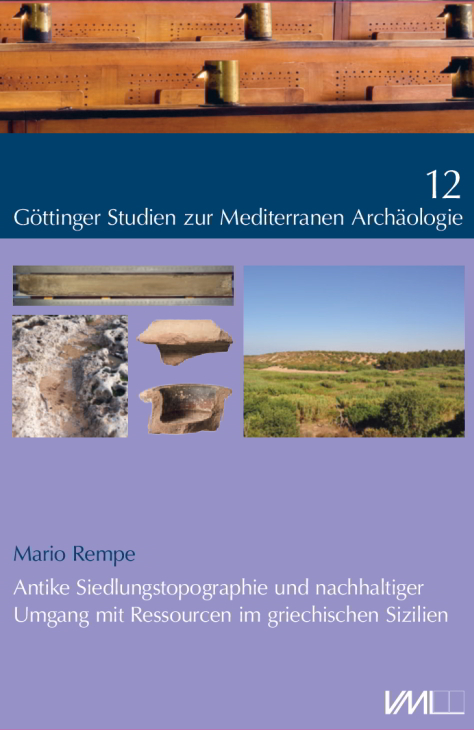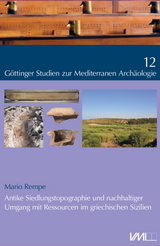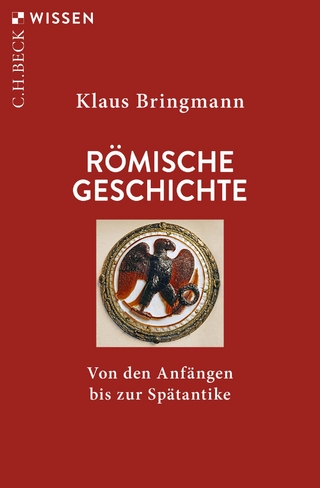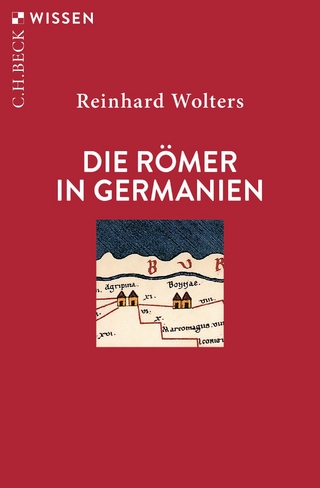Antike Siedlungstopographie und nachhaltiger Umgang mit Ressourcen im griechischen Sizilien
Seiten
2021
|
1., Aufl.
VML Vlg Marie Leidorf (Verlag)
978-3-86757-511-9 (ISBN)
VML Vlg Marie Leidorf (Verlag)
978-3-86757-511-9 (ISBN)
Die Studie untersucht den nachhaltigen Umgang mit Ressourcen im antiken Sizilien. Im Mittelpunkt der Betrachtung stand dabei das antike Kamarina im Südosten der Insel. Die Chora von Kamarina erschien angesichts der archäologischen Überlieferung und der wenig dynamischen Landschaft als besonders geeigneter Untersuchungsort. Neue Daten aus dem Göttinger Kamarina-Survey standen ebenfalls zur Verfügung.
Neben einer Bewertung der archäologischen und historischen Überlieferung zu Kamarina erfolgten Untersuchungen der Sedimente und der Geomorphologie der Chora von Kamarina, aber auch eine Rekonstruktion der Paläovegetation. Im Rahmen der geoarchäologischen Auswertung konnten keine auffälligen Ablagerungen ausgemacht werden, die für Episoden massiver Erosion sprechen. Die Fruchtbarkeit der Böden um die antike Stadt war nicht eingeschränkt, so dass die Bewohner Kamarinas in der Antike weder durch Unfruchtbarkeit der Böden noch durch Erosion beeinträchtigt waren. Durch archäobotanische und palynologische Ergebnisse ist deutlich geworden, dass die Griechen das Oanis-Tal intensiv nutzten und verschiedene Kulturpflanzen anbauten.
Maßnahmen nachhaltigen Agierens im antiken Sizilien zeigten sich in Irrigationssystemen, Kanälen und Zisternen, in der Nutzung marginaler landwirtschaftlicher Bereiche, der Einrichtung von zentralen Lagerstätten, dem Handel und der Vorratshaltung. Weiterhin trugen die Diversifikation der Anbaufrüchte, Düngemethoden, Brachen und Terrassierungen zur Erhaltung der Lebensgrundlagen bei.
Die Fähigkeit der antiken Siedler zum nachhaltigen Agieren wurde weiterhin durch vergleichende Überlegungen zur Landnutzung im antiken Sizilien bestätigt und anhand von vier weiteren Fallbeispielen veranschaulicht.
This study investigates sustainable resource use in ancient Sicily, focusing in particular on ancient Kamarina in the south-east part of the island. Given the available archaeological sources, and the fact that the surrounding landscape is not very dynamic, the chora of Kamarina seemed a particularly suitable study area. In addition, new data generated by the Göttingen Kamarina-survey were also available.
Alongside an assessment of the archaeological and historical sources relating to Kamarina, the sediments and geomorphology of the Kamarina chora were studied and the palaeovegetation was reconstructed. No marked sediment deposits indicating episodes of substantial erosion could be recognised during the geoarchaeological analysis. Soil fertility around the ancient city was not restricted, so that the inhabitants of ancient Kamarina were neither inhibited by poor soils nor by erosion. The archaeobotanical and palynological results clearly show that the Greeks intensively used the Oanis valley and grew a range of cultivars.
Measures of sustainable activity in ancient Sicily are visible in the form of irrigation systems, canals and cisterns, as well as in the use of agriculturally marginal areas, the building of central storage facilities, trade and stockpiling of resources. In addition, the diversification of cultivars, manuring methods, fallow fields and terracing contributed to the maintenance of the resources necessary for survival.
In addition, comparative reflections on land use in ancient Sicily further confirm that the ancient settlers were capable of acting sustainably, as is also illustrated using four further case studies. This study investigates sustainable resource use in ancient Sicily, focusing in particular on ancient Kamarina in the south-east part of the island. Given the available archaeological sources, and the fact that the surrounding landscape is not very dynamic, the chora of Kamarina seemed a particularly suitable study area. In addition, new data generated by the Göttingen Kamarina-survey were also available.
Alongside an assessment of the archaeological and historical sources relating to Kamarina, the sediments and geomorphology of the Kamarina chora were studied and the palaeovegetation was reconstructed. No marked sediment deposits indicating episodes of substantial erosion could be recognised during the geoarchaeological analysis. Soil fertility around the ancient city was not restricted, so that the inhabitants of ancient Kamarina were neither inhibited by poor soils nor by erosion. The archaeobotanical and palynological results clearly show that the Greeks intensively used the Oanis valley and grew a range of cultivars.
Measures of sustainable activity in ancient Sicily are visible in the form of irrigation systems, canals and cisterns, as well as in the use of agriculturally marginal areas, the building of central storage facilities, trade and stockpiling of resources. In addition, the diversification of cultivars, manuring methods, fallow fields and terracing contributed to the maintenance of the resources necessary for survival.
In addition, comparative reflections on land use in ancient Sicily further confirm that the ancient settlers were capable of acting sustainably, as is also illustrated using four further case studies.
Neben einer Bewertung der archäologischen und historischen Überlieferung zu Kamarina erfolgten Untersuchungen der Sedimente und der Geomorphologie der Chora von Kamarina, aber auch eine Rekonstruktion der Paläovegetation. Im Rahmen der geoarchäologischen Auswertung konnten keine auffälligen Ablagerungen ausgemacht werden, die für Episoden massiver Erosion sprechen. Die Fruchtbarkeit der Böden um die antike Stadt war nicht eingeschränkt, so dass die Bewohner Kamarinas in der Antike weder durch Unfruchtbarkeit der Böden noch durch Erosion beeinträchtigt waren. Durch archäobotanische und palynologische Ergebnisse ist deutlich geworden, dass die Griechen das Oanis-Tal intensiv nutzten und verschiedene Kulturpflanzen anbauten.
Maßnahmen nachhaltigen Agierens im antiken Sizilien zeigten sich in Irrigationssystemen, Kanälen und Zisternen, in der Nutzung marginaler landwirtschaftlicher Bereiche, der Einrichtung von zentralen Lagerstätten, dem Handel und der Vorratshaltung. Weiterhin trugen die Diversifikation der Anbaufrüchte, Düngemethoden, Brachen und Terrassierungen zur Erhaltung der Lebensgrundlagen bei.
Die Fähigkeit der antiken Siedler zum nachhaltigen Agieren wurde weiterhin durch vergleichende Überlegungen zur Landnutzung im antiken Sizilien bestätigt und anhand von vier weiteren Fallbeispielen veranschaulicht.
This study investigates sustainable resource use in ancient Sicily, focusing in particular on ancient Kamarina in the south-east part of the island. Given the available archaeological sources, and the fact that the surrounding landscape is not very dynamic, the chora of Kamarina seemed a particularly suitable study area. In addition, new data generated by the Göttingen Kamarina-survey were also available.
Alongside an assessment of the archaeological and historical sources relating to Kamarina, the sediments and geomorphology of the Kamarina chora were studied and the palaeovegetation was reconstructed. No marked sediment deposits indicating episodes of substantial erosion could be recognised during the geoarchaeological analysis. Soil fertility around the ancient city was not restricted, so that the inhabitants of ancient Kamarina were neither inhibited by poor soils nor by erosion. The archaeobotanical and palynological results clearly show that the Greeks intensively used the Oanis valley and grew a range of cultivars.
Measures of sustainable activity in ancient Sicily are visible in the form of irrigation systems, canals and cisterns, as well as in the use of agriculturally marginal areas, the building of central storage facilities, trade and stockpiling of resources. In addition, the diversification of cultivars, manuring methods, fallow fields and terracing contributed to the maintenance of the resources necessary for survival.
In addition, comparative reflections on land use in ancient Sicily further confirm that the ancient settlers were capable of acting sustainably, as is also illustrated using four further case studies. This study investigates sustainable resource use in ancient Sicily, focusing in particular on ancient Kamarina in the south-east part of the island. Given the available archaeological sources, and the fact that the surrounding landscape is not very dynamic, the chora of Kamarina seemed a particularly suitable study area. In addition, new data generated by the Göttingen Kamarina-survey were also available.
Alongside an assessment of the archaeological and historical sources relating to Kamarina, the sediments and geomorphology of the Kamarina chora were studied and the palaeovegetation was reconstructed. No marked sediment deposits indicating episodes of substantial erosion could be recognised during the geoarchaeological analysis. Soil fertility around the ancient city was not restricted, so that the inhabitants of ancient Kamarina were neither inhibited by poor soils nor by erosion. The archaeobotanical and palynological results clearly show that the Greeks intensively used the Oanis valley and grew a range of cultivars.
Measures of sustainable activity in ancient Sicily are visible in the form of irrigation systems, canals and cisterns, as well as in the use of agriculturally marginal areas, the building of central storage facilities, trade and stockpiling of resources. In addition, the diversification of cultivars, manuring methods, fallow fields and terracing contributed to the maintenance of the resources necessary for survival.
In addition, comparative reflections on land use in ancient Sicily further confirm that the ancient settlers were capable of acting sustainably, as is also illustrated using four further case studies.
| Erscheinungsdatum | 21.03.2021 |
|---|---|
| Reihe/Serie | Göttinger Forschungen zur Mediterranen Kultur ; 12 |
| Verlagsort | Rahden/Westf. |
| Sprache | englisch; deutsch; italienisch |
| Maße | 210 x 297 mm |
| Gewicht | 1510 g |
| Einbandart | gebunden |
| Themenwelt | Geschichte ► Allgemeine Geschichte ► Altertum / Antike |
| Schlagworte | Archäologie • Geoarchäologie • Siedlung • Siedlungsarchäologie • Sizilien • Survey • Umweltarchäologie • Wirtschaftsarchäologie |
| ISBN-10 | 3-86757-511-8 / 3867575118 |
| ISBN-13 | 978-3-86757-511-9 / 9783867575119 |
| Zustand | Neuware |
| Haben Sie eine Frage zum Produkt? |
Mehr entdecken
aus dem Bereich
aus dem Bereich
von den Anfängen bis zur Spätantike
Buch | Softcover (2024)
C.H.Beck (Verlag)
12,00 €




